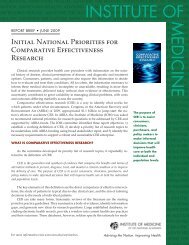Create successful ePaper yourself
Turn your PDF publications into a flip-book with our unique Google optimized e-Paper software.
The solution, according to Prime Minister Noda, rests<br />
in raising the sales tax from the current 5 percent to 10<br />
percent by 2015. This plan has become hugely unpopular,<br />
and it is not clear that it will pass the Parliament. If it<br />
doesn’t pass, confidence could be undermined, leading to<br />
higher bond yields. If it does pass, however, the effect on<br />
growth could be negative. Thus, Japan is caught between<br />
a rock and a hard place. Moreover, failure to pass Noda’s<br />
legislation would be indicative <strong>of</strong> a larger problem <strong>of</strong><br />
political gridlock. This means that passage <strong>of</strong> other reformoriented<br />
legislation would be less likely.<br />
Growth outlook<br />
Given the fiscal, trade, and energy situations, one could<br />
be forgiven for expecting poor economic performance.<br />
However, the reality is likely to be somewhat different —<br />
at least in the short run. There are a number <strong>of</strong> factors<br />
that should boost growth in the coming year. That would<br />
be welcome, given that Japan’s economy shrank by 0.9<br />
percent in 2011. Moreover, GDP declined in the fourth<br />
quarter at an annual rate <strong>of</strong> 2.3 percent. That was largely<br />
due to a decline in inventories and a drop in exports.<br />
The latter was due to the temporary effect on Japanese<br />
supply chains emanating from the floods in Thailand. The<br />
Japan<br />
good news is that the factors hurting growth in the fourth<br />
quarter were temporary.<br />
In 2012, growth should resume for several reasons. First,<br />
Japan’s government is expected to continue to spend<br />
massively on reconstruction, thereby boosting domestic<br />
demand. Second, the Thai floods are over, and supply<br />
chains have resumed. Third, the aggressive monetary<br />
policy has suppressed the yen, which should help export<br />
competitiveness. Fourth, the aggressive monetary policy<br />
has also boosted expectations <strong>of</strong> inflation, which have<br />
the effect <strong>of</strong> cutting real interest rates. This should help<br />
boost credit demand. Fifth, higher inflation could stimulate<br />
consumers to spend more. Sixth, following the depletion<br />
<strong>of</strong> inventories in the fourth quarter, businesses are likely<br />
to engage in inventory rebuilding in early 2012. Finally,<br />
the rest <strong>of</strong> the world is not doing as badly as previously<br />
expected. This should help to stabilize exports.<br />
Thus, a reasonable expectation for 2012 is that the<br />
Japanese economy will grow between 1.0 and 2.0 percent,<br />
inflation will be positive, and the yen will not resume<br />
its appreciation.<br />
Geographies<br />
31











